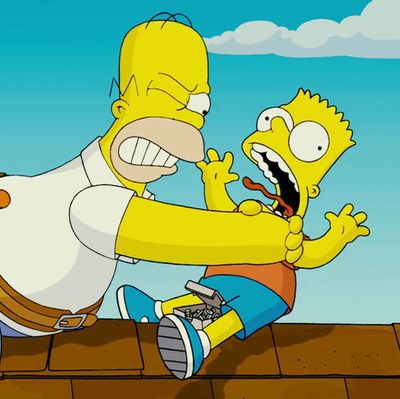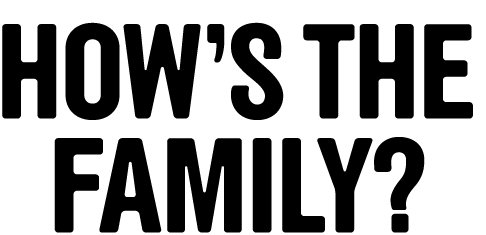
As long as there’s been TV, the family has been one of its favorite go-tos. All week long, Vulture is exploring how it’s been represented on our screens.
In the early days of television, family sitcoms were grounded in the idea that moms and dads were in charge and had everything under control. Father knew best, and mother did, too, because they were the rulers of the household and the indisputable grown-ups.
It’s 2018 now though, and things have changed. TV parents no longer always know best, or even second best. On the whole, as human beings, they are messier than they’ve ever been. They’re flawed, rude, occasionally foolish, often stressed-out, and sometimes outright negligent, especially if they’re doing their parenting on cable or a streaming platform.
In a piece last November, the Ringer referred to these types of television characters as “struggle parents,” figures who, unlike many family-show patriarchs and matriarchs of the past, make it blindingly clear that parenting is hard. Having children is the greatest thing that can happen to a person, these characters tell us, but also the life event that ultimately saps every last bit of one’s soul until she suddenly finds herself forcing her kids to throw a fake funeral for her in order to prove how much they care about her. (This actually happened on Better Things, and it was both inappropriate and one of the most beautiful things on television last year.)
The parents on today’s half-hour comedies (or dramedies) are materialistic and sometimes immature (Andre on Black-ish); constantly fighting with each other (Mitch and Cam on Modern Family); judgmental figures who flagrantly favor certain kids over others (Jessica on Fresh Off the Boat, but there are more); horrible neighbors with no sense of decorum (the DiMeos of Speechless); neurotic people who harbor long-held secrets about babies previously fathered by their son (the Pfeffermans of Transparent); adulterers (Sarah Pfefferman on Transparent, Elsa on Atypical); single moms who try to have sex on the same bed where their toddler is sleeping (Bridgette on SMILF); and adults who are sometimes openly resentful toward their kids (basically every mom and dad on television).
While parents on sitcoms in the past had their problems, it is difficult to imagine June Cleaver on Leave It to Beaver barking at a high-school principal the way Maya DiMeo does on Speechless, or Clair Huxtable arguing with any of her daughters the way Sam does on Better Things. That’s because the central purpose of the family sitcom has changed over the decades, as have our attitudes about family. What guides today’s portraits of parenting is a desire to tell it like it is. And the way it looks and feels to raise children has changed quite a bit over the past several decades.
The original, overriding point of the family sitcom was to provide entertainment that every family member parked in front of the television at home could appreciate. Its deeper, unspoken purpose was to reinforce the stability of the family unit and the roles within it. Even if moms or dads weren’t 100 percent perfect — though for the record, sometimes they sure seemed to be — they were usually decent, guided by a sense of morality, and more committed to properly raising their children than anything else in their lives. The characters who did stupid things on these shows were almost always the kids, and it was the parents who helped guide them back on the right path. When the juicer broke on The Cosby Show, it was Rudy (and, to be clear, also her friend Peter) who was responsible, and it was Clair’s and Cliff’s job to help her understand why she needed to own up to her mistake. On Family Ties, it was Alex who started taking speed, and it took the intervention of his parents to help him realize he had a problem.
Now the parents are often the juicer-breakers and speed-takers, metaphorically if not literally, because the family sitcom is built to a larger degree on something that wasn’t always central to the genre before: realism. When Norman Lear introduced All in the Family in the 1970s, these types of shows inched closer toward showing families as they really are, warts and all. But I think the real sea change that led to where we are now began in the late 1980s and early ’90s, with the one-two-three punch of Married…With Children, Roseanne, and The Simpsons.
The parents on these shows were not all bad. Roseanne and Dan Conner, for example, managed to be strong disciplinarians and relatively open-minded. But these were families that weren’t as TV-polished as, say, the Huxtables or the Keatons, and certainly weren’t as inherently likable. The Bundys were the crassest of them all, all teased mom hair, impudent teens, and couch-potato dads. But Roseanne Conner was outspoken and stereotypically white trashy, while Homer Simpson was the prototypical lunkheaded American male buffoon who regularly choked his “underachiever and proud of it” son. “Kids, you tried your best and you failed miserably,” Homer famously told Bart and Lisa in a season-five episode. “The lesson is: never try.” That line definitely falls under the heading: “Things Ozzie Nelson Would Never Have Said to His Children on Ozzie and Harriet.” Because The Simpsons and Roseanne were so terrific at offering unfiltered humor mixed with imperfect characters that were still empathetic, they, in particular, felt like the refreshing burst of honest air the sitcom had been needing.
In 1990, author and media studies professor Elizabeth Stone wrote a piece in the New York Times that noted another type of shift in TV families. In sitcoms that depicted working- or middle-class families, like Roseanne or Family Matters, she wrote that the parents were still being depicted as the authority figures, while in shows about white-collar and upper-middle-class families, the children were starting to seem wiser than the adults. “How is it that parents who are apparently so smart in the world are so stupid at home?” she asked. “Why are they such inadequate resources for their children? Maybe part of the point is that they’re too busy being smart in the world to be at home much or to be well informed about the pressing intricacies of home life. Perhaps the wisdom of upper-middle-class children can be seen as a precocity forced on them, a measure of the parents’ abdication of the family for the world.”
These days on television, parents are stupid at home regardless of their economic status. That’s not because they have abdicated their family for the world, as Stone put it, but because they either need or want to work, have a strong desire to be defined by more than the fact that they are mothers or fathers, and are more fully fleshed-out humans who do what humans do: screw up. They’re not simply parents, they’re also people still trying to figure stuff out. The idea that parents want to do more than just parent is far more universally accepted, in real life and on TV, than it was even 20 years ago, and that certainly has had an impact on the way parental figures are written and portrayed on sitcoms.
Americans in general also have become more accustomed to confessional stories — blame that on the digital age, or reality TV, or the fact that Oprah taught us to talk about our feelings — at the same time as the pressure for parents to do and be all things has risen. That has created a perfect storm that enables sitcoms to depict the chaos of family life with more candor and for viewers to look at imperfect parents and, rather than tut-tutting, nod their heads in recognition.
There’s another reason why sitcom TV parents look the way they do right now. Most of the people creating or portraying parents on television at the moment are either Generation-Xers or older millennials, the same people who were raised on Brady Bunch reruns and The Cosby Show, but also embraced Roseanne and The Simpsons. These generations spent more time during childhood watching TV than any previous generations, and having their ideas about family shaped by that from an early age. They saw parents they wanted to emulate, but also eventually became acutely aware that much of what sitcoms had fed them was comfort food.
These are the children of “Whatchoo talkin’ ’bout, Willis?” as well as “I’m Bart Simpson, who the hell are you?” These are also the adults who now raise their children with fierce commitment, just like TV taught them, but also strive to have more nuanced identities than simply “Mom” or “Dad,” because TV taught them that, too, either by example or by depicting a fantasy that felt too limiting. They’re the ones who learned from Homer Simpson that you can be a bad father, and it can be funny, and that you also get lots of chances to try and do better. Lots of chances. Like, at least 30 seasons worth of chances.



